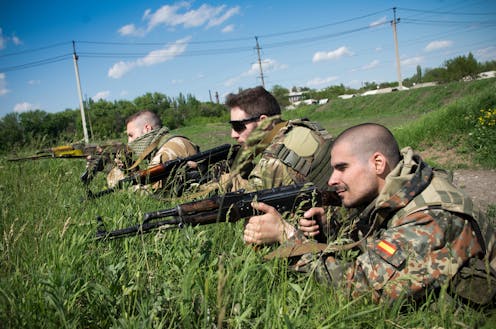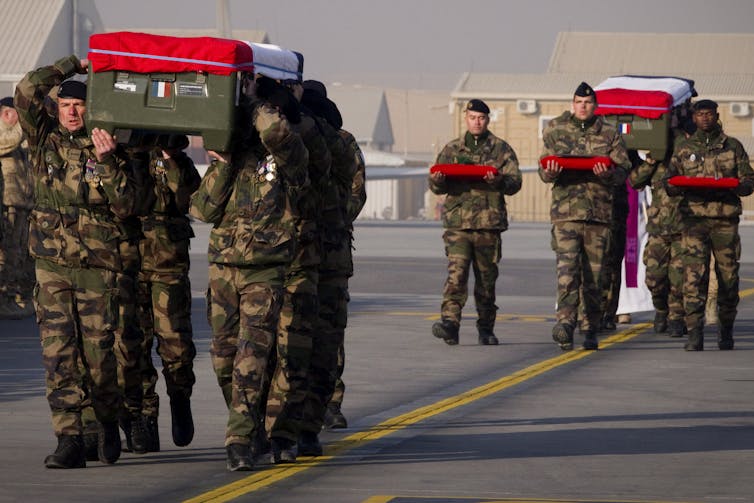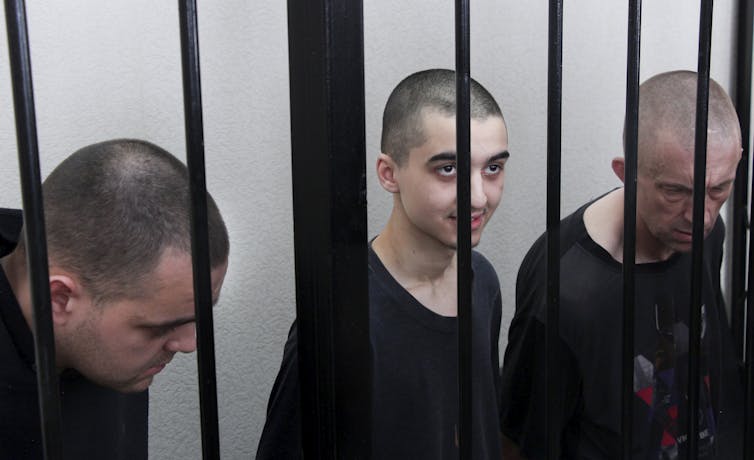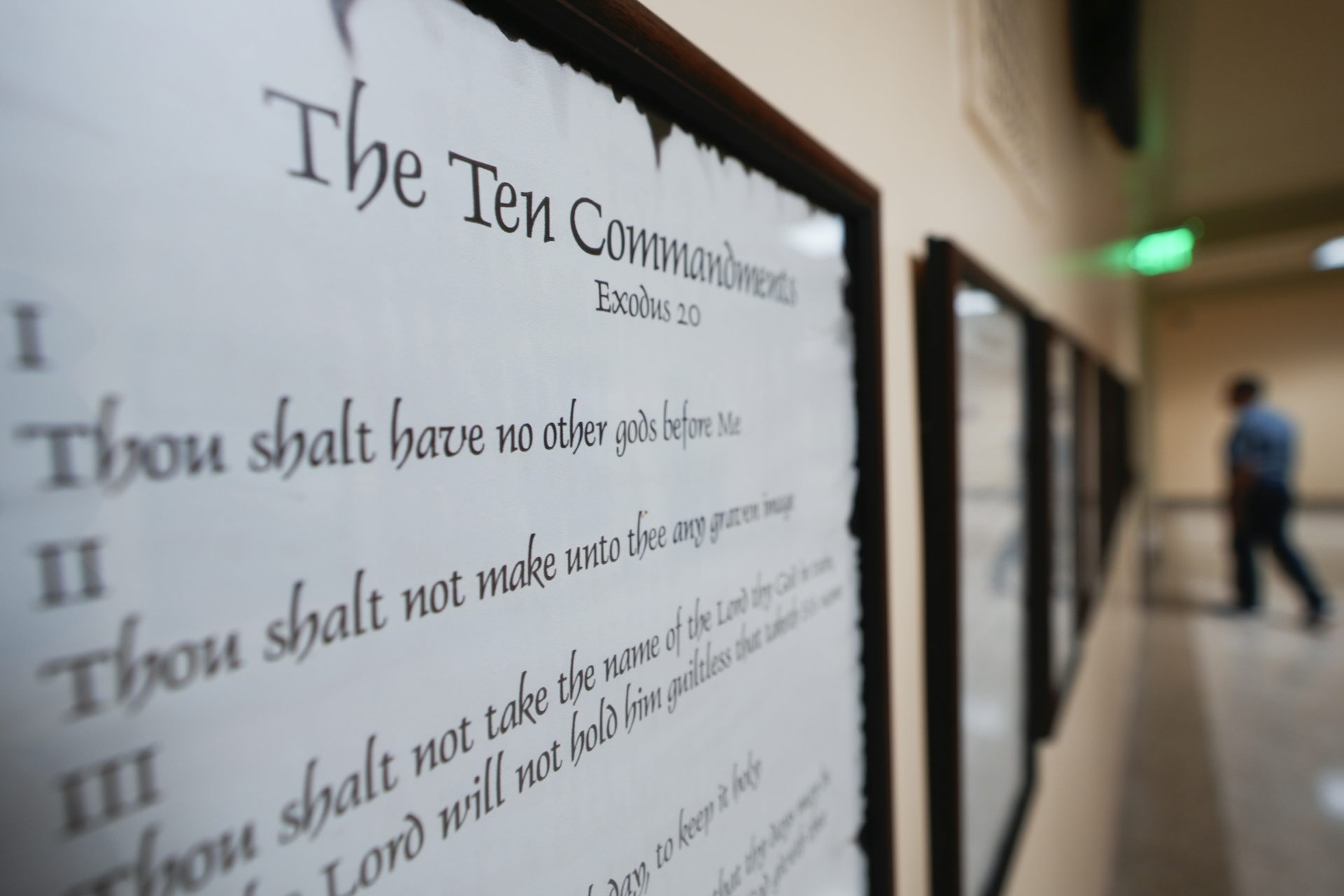Ukraine's foreign legion may be new, but the idea isn't
Many countries welcome foreigners who want to join their military forces.

After Russia launched its large-scale invasion of Ukraine in February 2022, many countries quickly responded by imposing sanctions on Russia and by sending weapons to help Ukraine defend itself.
But so far, the U.S. and its NATO allies have said they will not send troops.
Nonetheless, many non-Ukrainians want to fight for Ukraine for a variety of reasons, whether ideological, personal or political.
To take advantage of that support, Ukrainian President Volodymyr Zelenskyy has set up the International Legion of Defense of Ukraine for those who wish to volunteer – including U.S. citizens. While this particular effort may be new, the concept of a foreign legion – a military force comprised of volunteers from foreign countries – is more than 190 years old.

The French model
The “Légion étrangère,” or French Foreign Legion, is perhaps the world’s most famous – and infamous – foreign legion.
When it was created in 1831, its primary role was to fight France’s colonial wars. Since its formation, legionnaires born in more than 140 countries have fought under the French flag in a variety of conflicts throughout Europe, Africa, the Americas and Asia. In recent years, the French Foreign Legion has deployed to Afghanistan and the Sahel region of Africa.
Given their lineage as an expeditionary force, legionnaires are often among the first French troops sent into a dangerous environment. Yet each year, volunteers still travel to France in hopes of enlisting.
For some would-be legionnaires, it’s about joining a particular conflict. For instance, before the U.S. formally entered World War I, many Americans volunteered to become legionnaires to fight alongside the Allies. In many countries, including the U.S., citizens who swear an oath of allegiance to a foreign power risk having their citizenship stripped. The French Foreign Legion sidesteps this by requiring that legionnaires swear allegiance to the Legion itself – not to the country of France.
For others, joining the French Foreign Legion is about starting a new life. A legionnaire can apply to become a French citizen after only three years of service. Additionally, anyone wounded in action is “Français par le sang versé,” or “French by spilled blood,” and can immediately apply for French citizenship.
Legionnaires who are retired or on leave from active duty can find lodging and purpose tending to grape fields and making wine at the Legion’s own picturesque Provençal château.
There is, however, a dark side to what may look like romantic escapism. For one, the French Foreign Legion has often acted as a vehicle for colonial conquest and occupation. This is famously on full display in “The Battle of Algiers,” an evocative film about Algeria’s struggle for independence and France’s efforts to suppress that struggle.
Beyond the dangers of the battlefield, legionnaires have also faced sexual violence and other forms of abuse from fellow legionnaires – sometimes dying as a result.
The use of foreign fighters elsewhere
Many countries have taken a page from France’s playbook by allowing foreigners to serve in their armed forces. For example, in 1920, Spain founded its own foreign legion to fight in its colonial campaigns, namely the Rif War in Morocco.
During the Spanish Civil War, there were foreign volunteers on both sides: The battle-hardened Spanish Foreign Legion fought for Francisco Franco, while Republican forces opposed to fascism organized the International Brigades, which included more than 35,000 volunteers from around the world, including roughly 2,800 from the U.S..
Foreign fighters have played significant roles in many other conflicts. During the American Revolution, several foreign military officers, including Tadeusz Kościuszko, Friedrich Wilhelm von Steuben and the Marquis de Lafayette, made vital contributions to the struggle for independence.
During the Russian Revolution, professional non-Russian troops brought valuable military expertise to the nascent Red Army.
Similarly, during Israel’s War of Independence, World War II veterans proved so indispensable that former Prime Minister David Ben-Gurion called them “the Diaspora’s most important contribution to the survival of the State.”
Some countries don’t have a separate foreign legion, but nonetheless allow some foreigners to enlist. For instance, citizens of the European Union can join the Irish Defence Forces. Citizens of the Commonwealth, most of which is former parts of the British Empire, can join the British Army. And citizens of the Marshall Islands, Micronesia and Palau can join the U.S. military, along with foreign nationals who possess a green card.
As in France, serving in a foreign military can often help accelerate the naturalization process. Noncitizen U.S. service members, for example, can apply to become a citizen after just one year on the job. It appears that volunteers serving in the Ukrainian military will be eligible for Ukrainian citizenship at some point in the future.

The risks of war
In June 2022, two U.S. citizens fighting for Ukraine were captured by Russian forces and now face an uncertain future. This came just a few weeks after two Britons and a Moroccan were captured and subsequently sentenced to death.
Despite serving in the Ukrainian military, which under international law should entitle them to prisoner-of-war status, Russia argues that captured foreign fighters are mercenaries rather than soldiers and thus not eligible. It’s worth noting, though, that even Ukrainian prisoners of war don’t seem to be receiving proper treatment.
Ironically, Russia has for several years been trying to recruit foreigners into its own military. Back in 2015, Russia began allowing noncitizens to join, and it offers citizenship eligibility after five years of service. More recently, President Vladimir Putin has been vocal about his support for foreigners volunteering to join the fight against Ukraine.
Foreign volunteers on both sides of this conflict could soon be paying the ultimate price – if they haven’t already.
Joshua Holzer does not work for, consult, own shares in or receive funding from any company or organization that would benefit from this article, and has disclosed no relevant affiliations beyond their academic appointment.
Read These Next
Why US third parties perform best in the Northeast
Many Americans are unhappy with the two major parties but seldom support alternatives. New England is…
Abortion laws show that public policy doesn’t always line up with public opinion
Polls indicate majority support for abortion rights in most states, but laws differ greatly between…
50 years ago, the Supreme Court broke campaign finance regulation
A gobsmacking amount of money is spent on federal elections in the US. The credit or blame for that…






